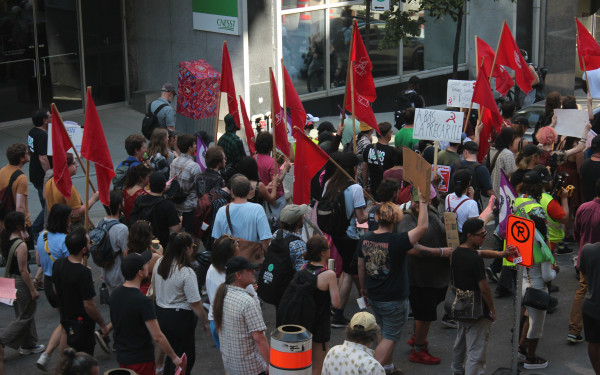Dollars & Cents
ConU’s Admin, Unions Receiving Markedly Different Increases
Their salaries are vastly different in dollar value, but senior administrators and unionized employees at Concordia are receiving similar pay hikes each year, the university said at last week’s Board of Governors meeting.
But that’s not entirely accurate.
At the November board meeting, Norman Ingram, chair of the History department, said that salaries for senior administrators seemed to have increased by 10.2 per cent, and that two senior administrators had been given salary increases of over 20 per cent.
According to a report prepared by Board of Governors Chair Norman Hébert, Jr. in response to Ingram’s question, senior administrators have received only a 2.75 per cent yearly increase.
Overall, these hikes “were consistent with the level of increases given to most of [the university’s] employees,” the report said.
Speaking to The Link, two union leaders at Concordia questioned that conclusion.
“No, we haven’t had a raise since 2007. So there you go,” said Eddie Ginocchi, vice-president of the Sir George Williams maintenance workers’ union, United Steelworkers Local 9538.
His union has been negotiating with the university since their collective agreement expired in 2008. Their previous agreement called for yearly increases of 3 per cent, but salaries have not gone up since that agreement expired.
“Not us,” said Robert Sonin, president of the Teaching and Research Assistants at Concordia. “No, we’ve had two increases in the last two years. One was one per cent, and the other was 0.75 per cent.”
Concordia’s library workers also have not had a raise since their agreement expired in 2008. Their previous agreement granted 2.5 per cent yearly increases, but, like the steel workers, they’re still in long-running negotiations with the university.
“We’re all in the same boat, all the unions. The same exact position,” said Ginocchi.
Concordia’s full-time and part-time faculty associations received 2 per cent and 2.5 per cent raises, respectively, in the most recent years of their collective agreements.
Neither could be reached for comment by press time.
“It’s understandable that they raise concerns,” said Hébert of the unions. “They’ll get increases at some point, but they’re not getting them now, [while] non-unionized employees who are management personnel will get annual increases,” he added.
“The Board has also been very clear in saying that we would like to have our collective agreements settled faster,” Hébert explained.
The university has added more employees to the unit responsible for bargaining with unions, Concordia President Alan Shepard explained. “There’s no question, though, that we still need to speed up,” he said. “What I’m hoping is that we can get to a better labour relations climate at Concordia.”
Hébert’s report also noted that three administrators had received retention adjustments—salary increases to encourage employees to turn down job offers from other schools.
“You try to always manage your talent and bring them along, but there are market forces out there and every once in a while it happens. And you have to use that judiciously,” Hébert explained.
“All businesses do it,” Shepard added. “If you’re at the top of your game and other people are courting you, an employer might choose to pay you more to keep you where you are.
“When I was just coming to Guelph, I went to my dean [at Texas Christian University] and said I had an offer from the University of Guelph, and I was leaving. And she thought I was playing this retention game, so she said, ‘Give me 24 hours and I’ll get back to you with the counter-offer,’ like that’s the whole game. And I said, ‘No, I’m moving to Canada, I’m emigrating, I’m out of here,’” Shepard said.
These salary adjustments should be used infrequently, he said.
“They’re not something you do every day,” he explained, and he doesn’t think they should become a bargaining strategy.
“Sometimes you have retention amounts, and there’s all kind of things particular to the university, but we’ll make sure that we get all that information in a very transparent manner [next year],” Hébert said. “There’s nothing to hide, anyway.”

_900_600_90.jpg)


_1_600_375_90_s_c1.jpg)
_600_375_90_s_c1.jpg)

